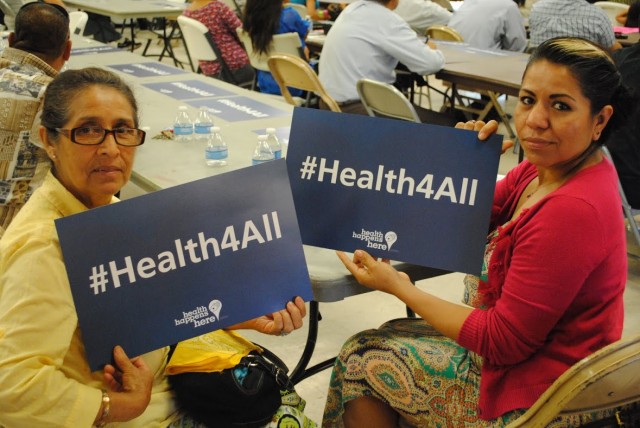Fresno’s Medically Indigent Services Program was set up decades ago to provide health coverage for the poor, and later, the undocumented. But now that the Affordable Care Act has gone into effect, the county says it doesn’t need the program anymore. Now tens of thousands of uninsured Fresnans have health coverage through Obamacare. More than that, the county says it can’t afford to keep the program going.
“With the reduction in the number of individuals who need to seek services in the Medically Indigent Services Program, there’s also a reduction in funding used to support that program,” says David Pomaville, director of Fresno county’s department of public health.
Closing or restricting the program could leave 6,000 undocumented Fresnans without care. The Affordable Care Act does not cover the undocumented. And, after a recent court battle, the county no longer has a legal obligation to cover them.
Pomaville says it would cost the county up to $21 million to continue coverage for the undocumented, but the county is short about $10 million. He says his department has already trimmed everywhere else possible.
“It is a balancing act,” he says. “The communicable disease investigators that are out investigating cases and trying to identify sources, we are stretched. The public health laboratory that we operate here; the sexually transmitted disease programs are really stretched as far as we can stretch them.”
Most counties in California do not provide health care services to the undocumented. Only about half a dozen do, mainly in urban areas like the Bay Area and Los Angeles. When the recession hit in 2008, Sacramento and Yolo counties dropped their coverage for the undocumented, and Contra Costa discontinued it for undocumented adults.
“In Fresno county, we’ve been able to hold on and deliver those services for longer than most counties have been able to,” Pomaville says.
But health care advocates say Fresno isn’t like most other counties. The economy depends on undocumented farm workers. Advocates say canceling the program ignores the contributions farm workers have made to the community.
“The question has become, does Fresno County value their farm workers?” says Sandra Celedon-Castro, manager of the advocacy group Fresno Building Healthy Communities. “Disease does not know immigration status. We’re going to be left with a population of folks in our community that are really sick, that are left to fend for themselves. What kind of community are we if we’re okay with that happening?”
The group organized a "Health4All" event earlier this month, where two hundred people gathered to protest the closure of the health program to undocumented immigrants.
“It would be really, really bad news,” says Grisanti Valencia. Her mother, who is undocumented, has terrible pain and numbness in her leg from a series of work injuries. Her neighbor is recovering from leukemia. “My mother, she’s already scared. She knows a lot of people, and those people are scared.”
Undocumented people can still get some care at Fresno’s community clinics, or the Emergency Room. But it’s the specialty care that gets lost if this program shuts down. That means no neurological consults, no cancer treatment.
“To me, it’s committing murder – getting rid of this program,” Valencia says. “Because you’re just letting these people die.”
The final decision rests with the county’s five supervisors. Most of them do not see it as the county’s responsibility to pay for care for the undocumented.
“If we are having a difficult time providing social services and a safety net for individuals that are documented American citizens, what allows individuals who are here illegally to derive and obtain that benefit?” says Andreas Borgeas, chairman of the board.
He asks why Fresno should do what Congress refused to.
“The onus seems to be on the county to provide undocumented coverage when the Affordable Care Act does not. It specifically does not,” he says.
He acknowledged that health care for farm workers is a good idea, in theory. It makes economic sense for Fresno. But farmers and lawmakers at every level point at each other when it comes down to who should pay for it.
Borgeas says community clinics that receive federal funding, like Clinica Sierra Vista, should be the ones to pick up the slack.
“I would be willing to explore that,” says Schilling, Sierra’s CEO. “It’s an issue of who would work for the kind of compensation I can offer?”
Fresno, like many other rural counties, has a shortage of specialist doctors in the area. Getting them to work for the reimbursement rates provided by state and federal programs is an even bigger challenge, Schilling says.
“If $125 or $150 buys a surgical consult, or a neurological consult, I’m game. Come on over,” he says. “The problem is, no one’s going to come work for me for that kind of money. They want substantially more than that.”
